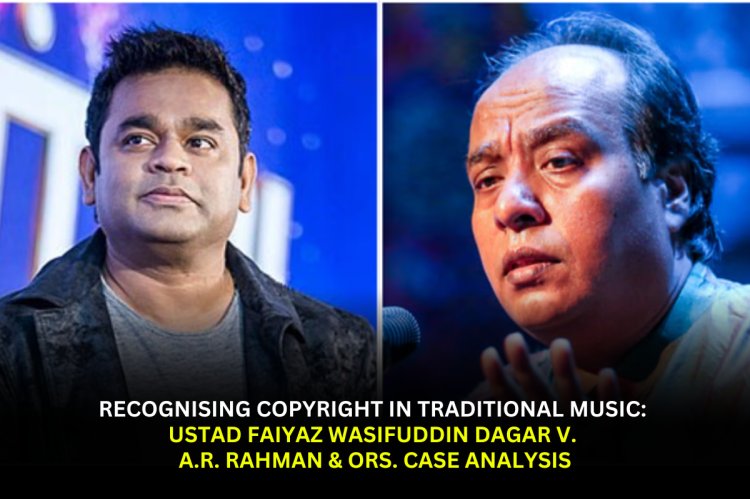Recognising Copyright in Traditional Music: Ustad Faiyaz Wasifuddin Dagar v. A.R. Rahman & Ors. Case Analysis
This article examines the landmark copyright dispute involving the Junior Dagar Brothers' traditional Hindustani classical composition "Shiva Stuti" and its alleged infringement by A.R. Rahman’s song "Veera Raja Veera" from *Ponniyin Selvan – 2*. It highlights the court’s recognition of originality and moral rights in traditional music under Indian copyright law, affirming protection for cultural heritage compositions amid modern musical adaptations.

Introduction
The modernisation of music has deeply affected traditional classical music and the Gharanas, which have been passed down through generations. The issues of Intellectual Property Rights over the traditional compositions have gained attention since the enablement of global access to such arts over digital platforms. One such landmark dispute emerged in the composition of the song “Veera Raja Veera”, alleged to have infringed the copyright protection of a classical Dagarvani composition of Junior Dagar Brothers – “Shiva Stuti”
Background of the Case
On March 28, 2023, the song “Veera Raja Veera” from the film “Ponniyin Selvan – 2 (PS – 2)” was released under the music direction of Defendant A.R. Rahman. Thereafter, on April 8, 2023, the audio-visual recording of the song was released on YouTube, in which the defendants have credited it as “Composition based on a Dagarvani Tradition Dhrupad”. Later on, it was also released in theatres and on OTT platforms.
The Plaintiff is the son of the Late Ustad N. Faiyazuddin Dagar and nephew of the Late Ustad N. Zahiruddin Dagar, popularly known as the “Junior Dagar Brothers”. They were Dhrupad vocalists and developed the Dagarvani Gharana of Hindustani classical music.
The Plaintiff filed a suit claiming that the composition of “Veera Raja Veera” was written and composed by the Junior Dagar Brothers, who are stated to be the first copyright holders in the composition. He stated that all the original compositions of the Junior Dagar Brothers were transferred to him. Thus, he seeks an injunction and remedies for recognition of copyright in “Shiva Stuti,” sung in the composition.
The Plaintiff sent letters to the defendants regarding the unlawful use of the composition and alleging infringement of the Junior Dagar Brothers' moral rights and the Plaintiff's copyright. However, he did not receive a response, and the defendants rejected all his claims. Hence, he filed the suit.
The Plaintiff submitted that although the lyrics are different, the beats are identical. The composition is also part of an album later released by PAN Records, which was recorded during a performance of the Junior Dagar Brothers.
Legal Provisions
According to Section 2(p) of the Copyright Act, 1957, “musical work” means a work consisting of music and includes any graphical notation of such work, but does not include any words or any action intended to be sung, spoken or performed with the music.
Moreover, Section 13 of the Act explains that for a work to claim copyright, it has to be an original musical work.
To know more about this you can follow the link below:
<iframe width="560" height="315" src="https://www.youtube.com/embed/YnJijWyi33w?si=h1UxQajDSrt0HDTO" title="YouTube video player" frameborder="0" allow="accelerometer; autoplay; clipboard-write; encrypted-media; gyroscope; picture-in-picture; web-share" referrerpolicy="strict-origin-when-cross-origin" allowfullscreen></iframe>
Arguments by the Defendants
The defendants argued that the manner of singing the Dagarvani style and the composition are not original and hence not capable of copyright protection. They also argued that the composition is not original since several renditions of it exist in the public domain. Thus, the defendants argued that no prima facie case was found for copyright infringement of the said composition.
Court’s Analysis and Judgment
The Court was of the opinion that the composition is an original work of the composer, and should be protected under the Copyright laws. Therefore, the Composer can claim all rights, including moral rights. Additionally, the Court stated that the composer may claim copyright on the original expression instead of the individual note.
The Court recognised the originality of the composition at the prima facie stage based on the evidence of the 1970s recorded album, as it is clear evidence of the ownership rights. The two elements “access” and “substantial similarity” are checked in the view of infringement. However, access is not a concern in this case, and for a work to be infringed, it is sufficient even if the music is copied.
A few mere changes in the lyrics of “Shiva Stuti”, a part of “Veera Raja Veera”, were found, which proves it is identical to the said composition. Hence, a prima facie case of copyright infringement was made. It confirmed that the original composers can retain moral rights and copyright protection over such work.
Conclusion
The Court ordered the credits to be replaced with the names of the original composers on all the online platforms. Moreover, the defendants were ordered to pay a cost of Rs. 2 lakhs to the plaintiff. The Court’s recognition of the originality of a traditional composition proves that the Indian laws not just protect the current art forms but also raise concerns over the cultural heritage art forms. This judgment marked a pivotal point in balancing traditional heritage over western values with modern copyright frameworks.












